 FEEDBACK: She said WHAT? Read what people think about our Classical Music Daily features, and have your say!
FEEDBACK: She said WHAT? Read what people think about our Classical Music Daily features, and have your say!
 CENTRAL ENGLAND: Mike Wheeler's concert reviews from Nottingham and Derbyshire feature high profile artists on the UK circuit - often quite early on their tours.
CENTRAL ENGLAND: Mike Wheeler's concert reviews from Nottingham and Derbyshire feature high profile artists on the UK circuit - often quite early on their tours.
 UPDATES: There's a new feature every day at Classical Music Daily. Read about the various ways we can keep in touch with you about what's happening here.
UPDATES: There's a new feature every day at Classical Music Daily. Read about the various ways we can keep in touch with you about what's happening here.
GEORGE FLYNN ON CD: AN OVERVIEW

ESDRAS MUGATIK explores
the work of this American composer
George Flynn is America's most sophisticatedly intense composer. His creativity plumbs the depths of the seething unconscious, but also aspires to transcendental elation. Nicholas Slonimsky wrote that his music 'is of a quaquaversal nature, disdaining nothing, absorbing anything of modernistic application.' Happily, many of George Flynn's works are represented on a considerable collection of CDs, which give a clear and substantive overview of the range and ambition of his inspiration.
Born in Montana and raised in the state of Washington, Flynn encountered the giant 'Concord' Sonata when young with the expected transformative and suggestive effect. Indeed, to compare this example of Ives' music and aspiration with Flynn's would be very suggestive. Both are a combination of seething emotion and Emersonian hope.
George Flynn has the most certifiable of Modernist credentials, having studied composition with such legendary figures as Vladimir Ussachevsky, Jack Beeson, Chou Wen-chung and Otto Luening at Columbia University in New York. Considering his excellence as pianist, though, I find it odd that of his piano studies I can find little information.
It has been said that it is for massive works of great scope and vitality that Flynn is best known. Trinity for solo piano is a prodigious collection of three works Kanal, Wound and Salvage.
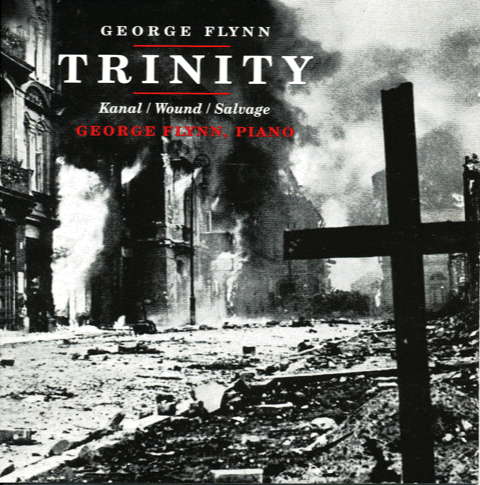
Kanal is titled from the Polish for 'sewer' — has there ever been a musical work so named? — and was inspired by the film by Andrzej Wajda, which depicts the uprising in occupied Poland in 1944. There can be no more devastating or devastated music possible.
This overwhelming set — where the second, Wound, is considered as 'arguably the most taxing piano music in the published repertoire' — has been recorded twice: once by Flynn himself in 1999, and then by Fredrik Ullén in 2007. Flynn's pianism has a snap and inner propulsion to it that are deeply characteristic, while Ullén's has a steely tone and a bitter clarity.
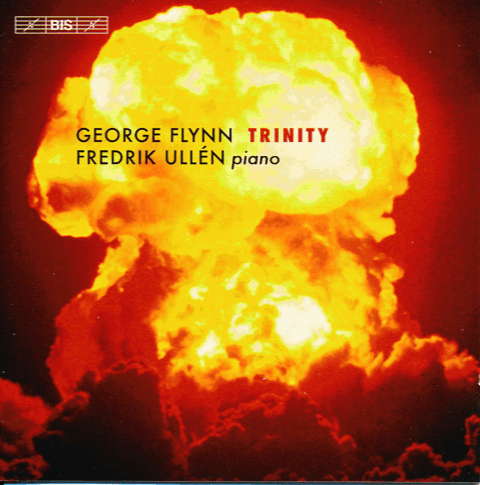
Listen — George Flynn: Kanal
George Flynn, piano (0:00-0:30)
Listen — George Flynn: Kanal
Fredrik Ullén, piano (0:00-0:30)
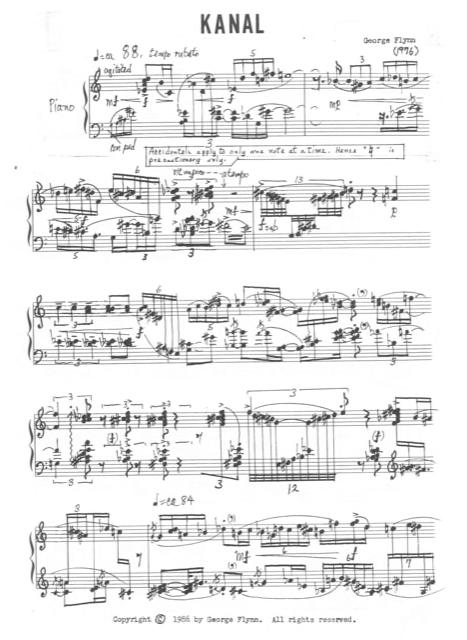
At the other spectral end of Flynn's imagination are his works Pieces of Night: Three American Nocturnes. These are works that 'meditate on the American experience' of the Vietnam War. The cover photo of the CD is of dying and wounded American soldiers and it is no small matter that one movement is subtitled 'Nightmare' and another 'Tumult and Lullaby'.
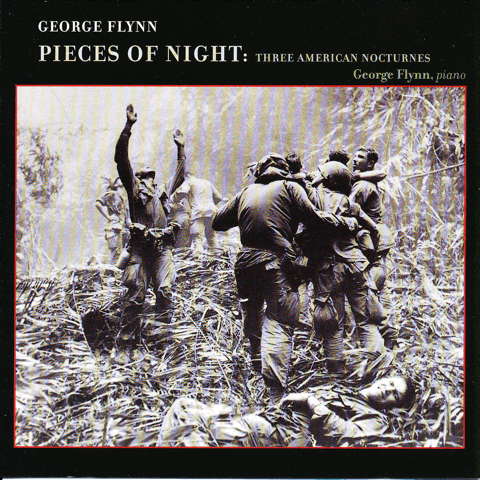
The discussion so far only brings us face to face with the sheer intensity of George Flynn's music. It burns. In my estimation, Flynn is the only composer with the inner fire capable of setting Ginsberg's Howl — that rabid, inverted and maniac paean to the American style, manner and mode of hyper-insanity. And Flynn has.
The Beat Generation — slightly before Flynn's time, and he was certainly never among their number — took the descriptive word to mean 'beatific', but, the reality of their alcohol sodden, drug injected and sexually debauched lifestyle was in no way beatific, but is sickeningly horrific. It made many mad, and most became sick — I also feel the movement has had baleful effects on the American character — and the movement ruined the lives of a vast swath of American youth. The victims of the Beat manner lay raving in asylums, alleys, flophouses and mansions, while their momentarily sober antics were paraded and glorified by the media until the Beat became the norm.
For Flynn's setting of this terrifying poem, there can be no other place to begin, save at the beginning:
Listen — George Flynn: Howl 'I saw ...'
(0:00-1:00)
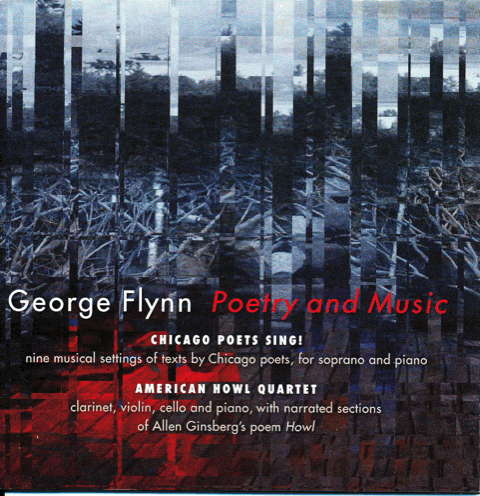
In many of his works Flynn struggles with the implications of modern life, modern politics and modern madness. The Beats are one aspect. The Vietnam War was another. Yet, it would be unwise to consider only the chaotic unconscious and horror of modern life as the sole sources for Flynn's inspiration.
Flynn often aims above and beyond that dark abyss, and finds something else — Toward the Light being the shining exemplar. This is one of the great masterpieces of positive art in American piano music. Sadly, the CD was not available to the author, but the score has been for a very long time. Quite simply it is a marvel.
One need for any creator is a firm discipline. Because Flynn is a superior pianist: indeed a super-virtuoso — who could he possibly have learned this from in Montana or Washington? — he possesses that great discipline and his recordings of his own works are ideal: polished, fervent and performed with absolute understanding of the piano and the nature of its sound. In Flynn's hands the piano has a expansive range of colours and voices, held in iron rhythmic control, but with a little swing that enlivens.
Flynn's solo piano music makes the utmost demands upon the pianist, not only with whirling figurations, rapid powerful chords, but also detailed and supernaturally subtle pedalling indications and requirements. It is no wonder that only the highest echelon of pianists dare to take up this music. Flynn must count the following as his performers. Their presence in the list attests to their quality:
Geoffrey Douglas Madge (Derus Simples)
Stuart Leitch (American Rest)
Heather O'Donnell (Remembering)
Fredrik Ullén (Trinity)
Carlo Grante (Glimpses of our Inner Lives)
Amy Briggs (American City)
I do not see an example of a strict piano concerto in Flynn's output — perhaps the overtly combative nature of the form does not accord with his sense of the soloist, or of the importance of the personal relationships of the ensemble — as exemplified by his chamber music. Still, the title track of American City might count. In this portion we hear abrupt chords from the piano and a gradual interspersing of musical notions from other players in a progressive accumulation of activity.
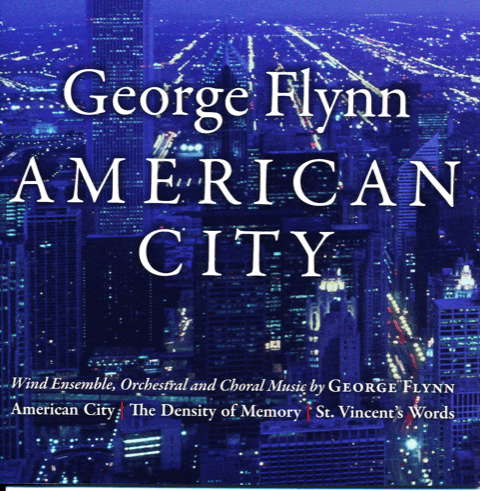
Listen — George Flynn: American City Concerto
(10:32-11:32)
This CD also includes The Density of Memory, a remarkable work for Clarinet Trio and Orchestra, and the intriguing choral work St Vincent's Words.
Unlike some solipsistic pianists, Flynn does not always work alone. He has long been in Chicago where he was professor at De Paul University and very active organizing concerts and musical events. He has interacted with a most stellar array of musicians from the Windy City — does anyone really call it that? — such as: Eugene Gratovich, Larry Combs, Keith Conant, Christopher Costanza, Katherine Hughes, Stefan Hersch, Peter Szczepanek, Leila Bowie, Mark Baldwin, Chicago Quartet, Cory Tiffin and Doyle Armbrust.
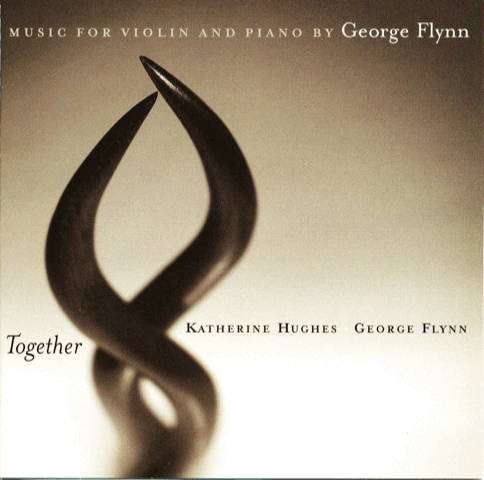
Another work that is fortunately available in two different performances is the massive Together for violin and piano. Katherine Hughes joined Professor Flynn for the 2005 recording, while Stefan Hersch was soloist for the 2012 recording, again with George Flynn as pianist. Let us compare just the opening minute from each soloist:
Listen — George Flynn: Together
Katherine Hughes, violin and George Flynn, piano (0:00-1:00)
Listen — George Flynn: Together
Stefan Hersch, violin and George Flynn, piano (0:00-1:00)
Hersch has a smooth, slightly insouciant (as in relaxed, or equable) sound, while Hughes' sound is gravely acute. The former makes for a more fluid and elegant relationship, while Hughes inhabits a realm of a higher and sweltering heat. It makes for a fascinating issue of performance practice to realize Flynn is the composer, playing the piano part, and yet, the results are so different. This is not a criticism of Flynn, it is actually a critique of monomaniacal musicological performance practice thinking, which demands the singular result. There is a serious document to be written on the comparison of these two excellent performances.
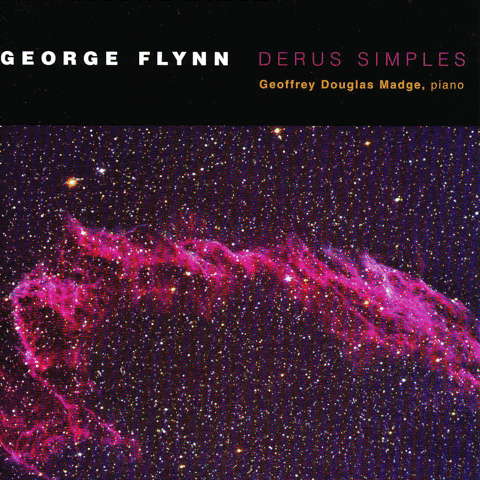
Many of the CDs examined here have some contribution from the mathematician, philosopher and musicologist Kenneth Derus. There can be no doubt that theirs has been a fruitful collaboration for many years. Flynn wrote:
Derus Simples celebrates my friendship with Kenneth Derus (who commissioned the work), and honours the composer Kaikhosru Sorabji. Its title acknowledges certain aspects of Ken's writings, including his "Perigraph" (published in Sorabji: A Critical Celebration, Scolar Press, 1992) and his The Qualities of Melodic Simples, (1989-90) both of which reflect on listening to and remembering Sorabji's music.
In his writings Ken suggests that we consider melodies, not notes, as basic elements ("simples") in listening to and remembering Sorabji's music. This notion of things being "simples" (basic elements with no parts) in certain worlds, but obviously structures (full of parts) in other worlds, led me to consider writing a work that grows out of, embellishes, extends and eventually returns to a "simple" (in this case a tritone), and that exploits textural, gestural and formal growth and decline in a variety of circumstances, within a simple and coherent, yet internally complex shape. The title thus couples Ken's name with a word representing his ideas that stimulated me.
— Programme Note to Published score of Derus Simples, Imprimis Music, 1995
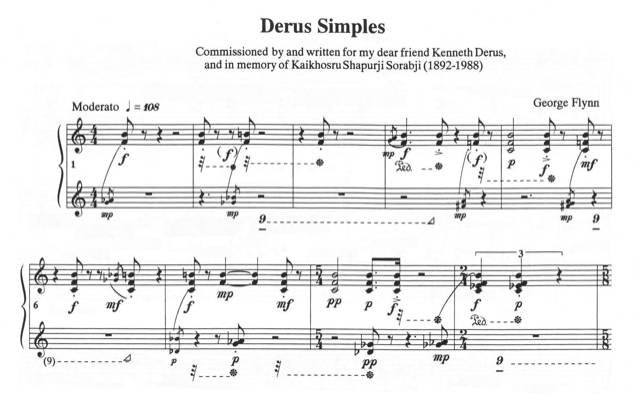
Listen — George Flynn: Derus Simples
Geoffrey Douglas Madge, piano (0:00-0:26)
In this example is also seen a crucial element of Flynn's musical thinking: the development, elaboration and evolution of simple ideas — seeds, or 'Derus Simples' — into large, complex and emotionally powerful compositions.
The CDs are sumptuously produced, with wonderful and evocative graphics, copious and detailed programme notes, informative biographies and even sometimes files of the musical scores for study.
Southport, which has released most of the CDs, is more properly considered a Jazz label — a strange arabesque in culture. Here is a certifiable extreme modernist rubbing shoulders with jazz. The free form elements, the improvisatory aspects, the fragmented gestures and the harmonic language all connect with avant-garde jazz in a fruitful interconnection.
I have tried in this article — which is not a review — to provide a specificity that remains suggestive and inclines towards an opening up, unfolding and enlargement of ideation into a grander and more fulsome evaluation. But, that I must leave for others: other listeners, other writers and other musicians. But, George Flynn's landscape — the American psyche, the second city, the realm of the subconscious, and the realm of superconscious is a wide ranging one which permits of many hardy explorers. Good luck in your sonic expeditions in George Flynn's world!
Thunder Bay, Ontario, Canada

FURTHER INFORMATION: GEORGE FLYNN
FURTHER INFORMATION: KAIKHOSRU SHAPURJI SORABJI
FURTHER INFORMATION: SOUTHPORT RECORDS
FURTHER INFORMATION: BIS RECORDS

